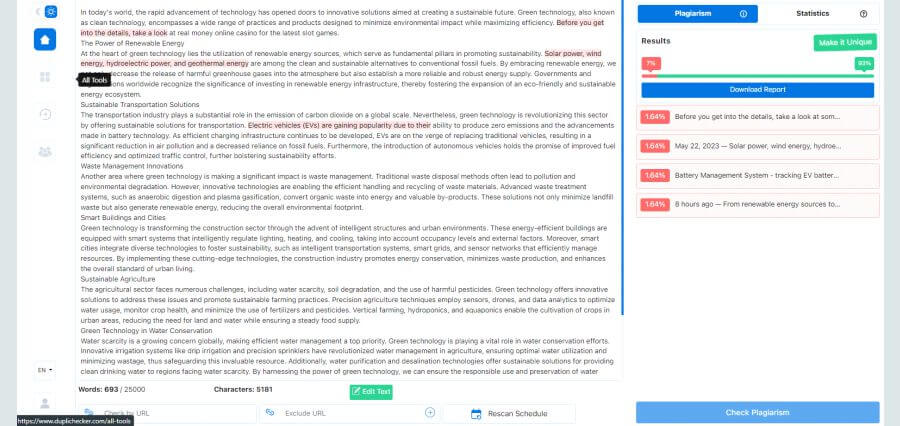In today’s world, the rapid advancement of technology has opened doors to innovative solutions aimed at creating a sustainable future. Green technology, also known as clean technology, encompasses a wide range of practices and products designed to minimize environmental impact while maximizing efficiency. Before you get into the details, take a look at a real-money online casino for the latest slot games.
The Power of Renewable Energy
At the heart of green technology lies the utilization of renewable energy sources, which serve as fundamental pillars in promoting sustainability. Solar power, wind energy, hydroelectric power, and geothermal energy are among the clean and sustainable alternatives to conventional fossil fuels. By embracing renewable energy, we not only decrease the release of harmful greenhouse gases into the atmosphere but also establish a more reliable and robust energy supply. Governments and organizations worldwide recognize the significance of investing in renewable energy infrastructure, thereby fostering the expansion of an eco-friendly and sustainable energy ecosystem.
Sustainable Transportation Solutions
The transportation industry plays a substantial role in the emission of carbon dioxide on a global scale. Nevertheless, green technology is revolutionizing this sector by offering sustainable solutions for transportation. Electric vehicles (EVs) are gaining popularity due to their ability to produce zero emissions and the advancements made in battery technology. As efficient charging infrastructure continues to be developed, EVs are on the verge of replacing traditional vehicles, resulting in a significant reduction in air pollution and a decreased reliance on fossil fuels. Furthermore, the introduction of autonomous vehicles holds the promise of improved fuel efficiency and optimized traffic control, further bolstering sustainability efforts.
Waste Management Innovations
Another area where green technology is making a significant impact is waste management. Traditional waste disposal methods often lead to pollution and environmental degradation. However, innovative technologies are enabling the efficient handling and recycling of waste materials. Advanced waste treatment systems, such as anaerobic digestion and plasma gasification, convert organic waste into energy and valuable by-products. These solutions not only minimize landfill waste but also generate renewable energy, reducing the overall environmental footprint.
Smart Buildings and Cities
Green technology is transforming the construction sector through the advent of intelligent structures and urban environments. These energy-efficient buildings are equipped with smart systems that intelligently regulate lighting, heating, and cooling, taking into account occupancy levels and external factors. Moreover, smart cities integrate diverse technologies to foster sustainability, such as intelligent transportation systems, smart grids, and sensor networks that efficiently manage resources. By implementing these cutting-edge technologies, the construction industry promotes energy conservation, minimizes waste production, and enhances the overall standard of urban living.
Sustainable Agriculture
The agricultural sector faces numerous challenges, including water scarcity, soil degradation, and the use of harmful pesticides. Green technology offers innovative solutions to address these issues and promote sustainable farming practices. Precision agriculture techniques employ sensors, drones, and data analytics to optimize water usage, monitor crop health, and minimize the use of fertilizers and pesticides. Vertical farming, hydroponics, and aquaponics enable the cultivation of crops in urban areas, reducing the need for land and water while ensuring a steady food supply.
Green Technology in Water Conservation
Water scarcity is a growing concern globally, making efficient water management a top priority. Green technology is playing a vital role in water conservation efforts. Innovative irrigation systems like drip irrigation and precision sprinklers have revolutionized water management in agriculture, ensuring optimal water utilization and minimizing wastage, thus safeguarding this invaluable resource. Additionally, water purification and desalination technologies offer sustainable solutions for providing clean drinking water to regions facing water scarcity. By harnessing the power of green technology, we can ensure the responsible use and preservation of water resources.
The rise of green technology is transforming industries and paving the way for a sustainable future. From renewable energy sources to sustainable transportation and waste management, green technology offers innovative solutions to tackle pressing environmental challenges. The integration of smart technologies in buildings and cities promotes energy efficiency and resource optimization. Additionally, sustainable agriculture practices ensure food security while minimizing the ecological impact. Embracing green technology is crucial not only for environmental preservation but also for creating a healthier and more prosperous world for future generations.



